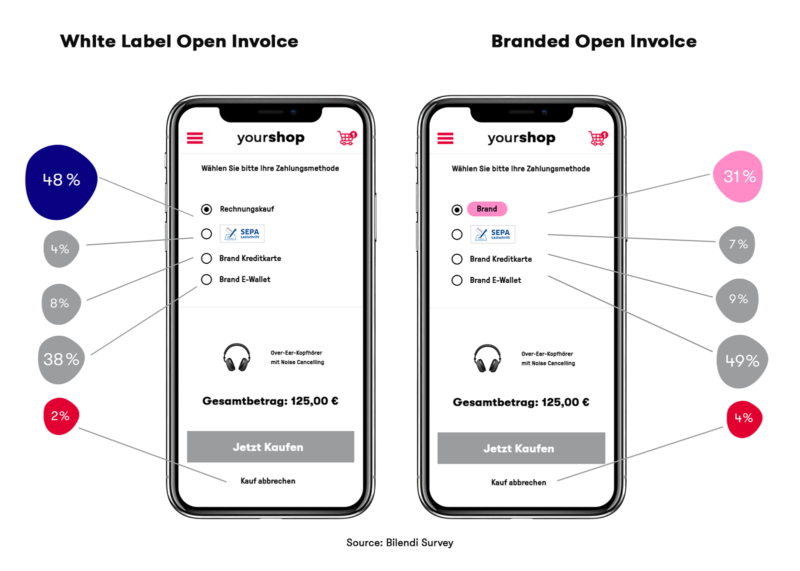
Why trust is so important when it comes to payments
Trust is an important component when shopping online. Shoppers not only have to trust the merchant, but also the payment method they choose. Bilendi GmbH took a look at whether it is helpful for shoppers to know which payment provider they are using to pay for their purchase.
As a leading provider of white label open invoice, Ratepay regularly checks how the payment behavior of online shoppers is developing. Particularly interesting: Which payment method is preferred by customers during checkout, and which has the strongest performance?
The following questions were asked as an example for open invoice: Is the white label option (without the provider’s name) preferred? Or is it the branded-label option (prominent logo of the provider)? The fictitious online shops offered both options. In addition, other popular payment methods could be selected. In each case, 800 test persons, 1600 in total, clicked through the payment processes. When selecting the participants throughout Germany, care was taken to ensure an even gender and age distribution. A prerequisite for access was that the test persons had indicated open invoice as one of their preferred payment methods.

It became clear that the branded solution was less attractive to many of the fictitious customers than the white label solution. While white label invoice was preferred by 48 percent of the participants, only 31 percent preferred branded open invoice. The remaining test persons switched to other payment methods. An interesting observation was made with regard to the dropout rate: While two percent of the test persons abandoned their purchase in the white label option, four percent did so in the branded label option.

Why did almost half of the customers opt for white label open invoice? Many shoppers want more time to pay for their goods and services. The protection of their own data also plays an important role. This is also an important indicator for the abandonment rate: according to the test persons, the compulsory disclosure of their own telephone number was the main reason for abandoning their purchase.
Stay up to date with the payment world
Sign up to our monthly newsletter
It is clear that open invoice is one of the most popular payment methods in the DACH region. It therefore makes sense for most online shops to offer it. When asked whether open invoice should be offered in the shops’s own design or with the direct visibility of a payment brand, our survey gives a clear answer: the respondents preferred to complete their purchase with open invoice without being distracted by another brand. They don’t have to think about whether they want to trust the often unknown payment providers. After all, they trust the merchant with whom they have an obvious contract. And trust is, after all, the basis of a good customer relationship.




